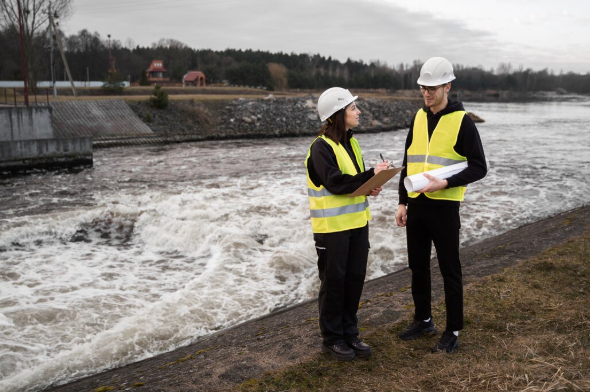How Bio-Culture Wastewater Treatment is Revolutionizing School Wastewater Management

Wastewater Treatment
Wastewater treatment has become one of the most pressing environmental concerns of our time. With urbanization and population growth on the rise, the demand for an affordable, ecologically friendly wastewater solution has never been greater. One of the most prospective novelties of that sphere is a bio-culture wastewater treatment, the natural treatment of sewage linked with the participation of beneficial bacteria.
For schools, where cleanliness, health, and sustainability are paramount, implementing contemporary school wastewater systems help keep you in line with regulations and help maintain a greener planet.
What is Bio-Culture Wastewater Treatment?
Wastewater bio-culture treatment is an environmental method of processing sewage using particular strains of microbes to decompose the organic waste. Unlike conventional chemical treatment methods, bio-cultures function by natural degradation of organics, they reduce odours and improve treated water quality.
Key benefits include:
- Eco-friendly: Non toxic to the environment and eliminates the need for chemicals.
- Odor control: Reduction of stench near biogas-production facilitiesHideInInspector: p st.urbanPublicationsRh.D.odour_prevention_protect.environmentJournal Odour Prevention to Protect the Environment.
- Economical: Less cost in implementation, operation, and repair.
- Effective treatment: Efficiently decomposes fat, oil, grease and organic sludge.
This process means that facilities such as schools can deal with wastewater in a sustainable manner, while also keeping children safe.
Why Schools Need Wastewater Management?
Wastewater is generated at schools each day from washrooms, cafeterias, kitchens and other systems. Untreated, this wastewater can cause health and environmental problems. School wastewater management systems also provide:
- Hygiene & Safety -No contamination of ground water,zero chances of being affected by water borne diseases.
- Compliance – Complies with government standards for the disposal of waste water.
- Sustainability – Recycled water is suitable for irrigation, flushing or landscaping.
- Cost Effective – Lowers water usage and reduces maintenance overtime.
Applying bio-culture wastewater treatment as one of the treatments for school wastewater will enable the school to have a “safe and eco-future campus”.
How Does Bio-Culture Wastewater Treatment Work in Educational Institutions?
Here is how bio-culture technology can be introduced in the management of school waste water.
- Bio-Culture Inoculation: Growth media for special bacteria are inoculated on the treatment system.
- Organic Decomposition – Bacteria feed on organic matter, oil and grease, to diminish sludge.
- Less Odor – Biological activity reduces the level of hydrogen sulfide and other bad smelling gases.
- Re-use of water – The treated water could be re-used for non-potable purposes (eg flushing, irrigation).
Such a simple method is particularly well suited for schools whose effluent is continuous but not of industrial complexity.
Benefits of Bio-Culture in Treating School Waste/Municipal Waste/Garbage Water
- Environmentally Friendly – No chemicals also guarantees students and staff stay safe.
- Easy Usage – Simple to be compatible with the current wastewater treatment facility (STP).
- Long-Term Savings -34 Reduces the cost of sludge disposal and general plant operation costs.
- Increased Effectiveness – Improves BOD (Biological Oxygen Demand) and COD (Chemical Oxygen Demand) reduction for cleaner water.
- No More Smelly Campuses – Makes the school healthy and fragrance free.
Ekam Eco Solutions: Pioneering the Transformation
Companies such as Ekam Eco Solutions provide ecological sanitation products and services, from bio-culture wastewater treatment to school wastewater management systems. By using eco technologies schools can be green and still make sure they are compliant and safe.
Their offerings drive wastewater treatment efficiencies and actively support the wider environmental preservation agenda through encouraging water reuse and sustainable sanitation.
FAQs
Q1. How is bio-culture wastewater treatment different from the conventional methods?
Bio-culture offers an effective as well as astronomical alternative to chemical treatment – the natural occurren comfier organisms which can do away with waste, are brought to work for you, the advantages being – it is eco-friendly, economical and less harmful for continuous use over the years.
Q2. Can schools reuse treated wastewater?
Yes, processed wastewater of this type can be recycled for gardening, flushing toilets and landscaping and people can save a lot on their water bills.
Q3. How costly is bio-culture in wastewater treatment for schools?
Not at all. It lowers maintenance, sludge disposal and overall operation costs.
Q4. Do bio-cultures work to control odors?
Yes, it does a great job of eliminating foul smells by decomposing the organic matter the way nature intended.
Q5. How Ekam Eco Solutions can help schools?
Ekam Eco Solutions offers tailor-made bio-culture technology based school sanitation solutions enabling plant maintenance, hygiene, compliance and sustainability.
Conclusion
For schools in need of sustainable and cost efficient wastewater options, nothing compares to bundling bio-culture wastewater treatment with school wastewater management. It promotes clean landscapes, healthy students and is a model for future generations.
“With organizations such as Ekam Eco Solutions taking the lead, schools can set an example and instill a sense of environmental stewardship, in addition to achieving long-term cost and hygiene benefits.”






